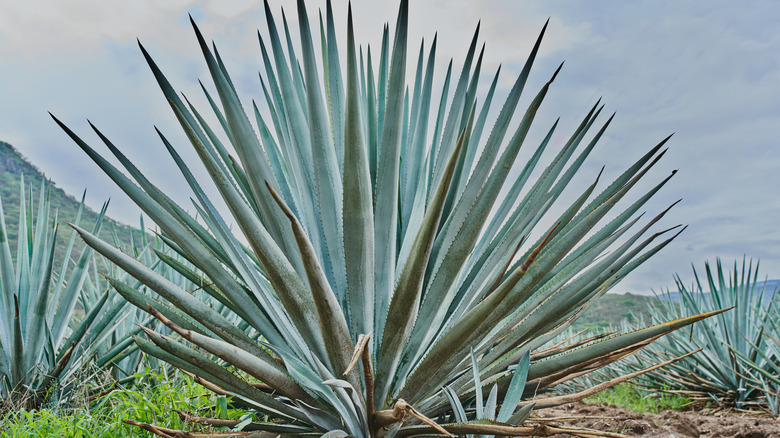Extreme Weather In Mexico May Soon Cause A Tequila Shortage
When most people think about the impacts of climate change, they probably aren't focusing on desert climates already known for being hot and arid. We've all heard about the negative effects on grain crops, fish, and wine vineyards, however, in the deserts of Mexico and the American Southwest, the conditions have become so extreme that even drought-resistant plants are starting to feel the impact, which could be bad news for the tequila fans of the world.
According to Fox 4, ongoing drought conditions in central and southern Mexico paired with unseasonable, extreme heat are making survival difficult, even for succulent plants like agave, which is the main ingredient in tequila and mezcal spirits.
Unfortunately, the detrimental weather trend does not seem to be slowing down. Data shows that most of the agave-growing areas of Mexico have received less than a quarter of their usual precipitation in the first quarter of this year, while temperatures in the country's southern regions surpassed a record-breaking 110 degrees in February. If these patterns continue, it could spell disaster for the liquor category that has been skyrocketing in popularity in the U.S.
The future of agave
The reason agave plants have been able to survive the record-breaking heat and drought is because of a unique adaptation that allows them to close their pores during the day, which prevents them from losing water. However, the pollinators they depend on to reproduce are not faring as well in the heat. Humans, bats, bees, and hummingbirds are susceptible to dehydration and heat damage, and they play a huge part in the plants' life cycles.
For example, long-nosed bats have specifically evolved alongside the agave plant to feed off its nectar, a process that leads to cross-pollination and breeding of plants. Without these bats, the survival of agave plants is even more at risk.
Thankfully, there may be other solutions for agave cultivation, which is important not just for brewing your favorite tequila, but also as a natural sweetener. According to CNN, studies are underway to test the growth of agave plants in parts of California, where climate change has made some land too arid for other crops, but could still support agave growth. In California, agave would be less dependent on bats to pollinate it, so the plants could thrive, provided they can survive the unpredictable swings in precipitation that the state is currently experiencing.

